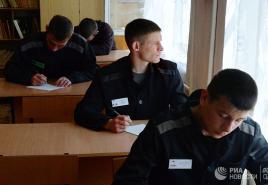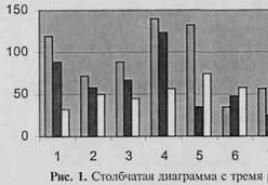Russian prisons - is there life after? How prison changes people and is it possible to find something good in it How people change after prison.
MOSCOW, September 11 - RIA Novosti, Larisa Zhukova. In Russia, more than six hundred thousand people are serving sentences in colonies. About 300,000 Russians are released every year. But not everyone returns to society: problems with documents, work, family, housing prevent many from starting life from scratch. The RIA Novosti correspondent found out how the rehabilitation system works in our country.
Get stuck in yesterday
In 1995, sewing mechanic Alexander Tishkin, a resident of the small, Soviet-era industrial town of Belovo in the Kemerovo region, was sentenced to seven and a half years in prison for robbery.
“When gangsterism began to rampage in Kuzbass, I worked in a garment factory,” he recalls. “I didn’t receive a salary for ten months. I had no choice but to go into crime to get food. I don’t justify myself, but others There were no options available."
He calls the years spent in prison "lost time": when he got out of prison, the world changed dramatically, and he turned out to be a man stuck "in yesterday." But worse was that Tishkin did not have a real one either.
While he was serving his sentence, his mother sold the apartment in which he was registered to scammers.
Six months after his release, the man had to prove that he was a Russian citizen: "They carefully 'erased' me from that address, as if I had never lived there."
But even after the restoration of his passport, Tishkin faced stigma: a professional mechanic and carpenter was denied employment everywhere. The security service of each company checked for a criminal record. Although without documents, just looking at him, one could say: he was sitting. “I foolishly made tattoos on my arms,” the man says.
At first he lived with his father in a rented apartment, and then his father passed away. So he was left without friends and family, a certain place of residence and work.
“I was overwhelmed by the feeling of loneliness. But I did not lose heart. My character was formed during the years of imprisonment: I thought about the future for a long time and understood how dangerous it was to lose freedom,” says Tishkin.
Vicious circle
More than 600,000 Russians are serving their sentences in prison, says Alexei Yunoshev, head of the department for the protection of human rights in places of detention at the Office of the Commissioner for Human Rights. About 300,000 of them are released every year.
Those released are given personal belongings, dry rations and travel documents. The passport can be returned by paying the state duty at Sberbank. But over the years of imprisonment, many forget their past passport details and subsequently face the problem of restoring identity documents. This makes it difficult to apply for social and medical assistance, the human rights activist claims, and many prisoners have been diagnosed with serious diseases.
But this is not the biggest difficulty, Yunoshev continues, it is difficult for former prisoners to return to society if their social ties are broken. Starting life from scratch is also not easy: everything depends on numerous refusals to apply for a job. Most prisoners receive ranks in working specialties, but these certificates are always stamped by the Federal Penitentiary Service. To show them to the employer means to lose the last chances for employment. Often they don’t even get to the interview: many former prisoners do not know how to write a resume and communicate politely over the phone, for example, introduce themselves at the beginning of a conversation.
The unwillingness of society to accept a person who has served a sentence leads to the fact that he either relapses in order to return to a more familiar prison system, or finds solace in drugs and alcohol, Yunoshev summarizes.
Lost freedom
“I needed to find myself, and I went to travel around Russia,” recalls Alexander Tishkin. For ten years of wandering, he visited all major cities. In each of them, he lived in social rehabilitation centers for ex-convicts: “At any stop, poles hang ads offering help to people who are in a difficult situation. I just got into such a situation,” he says.
Such organizations are created on the personal enthusiasm of people who, as a rule, have experience in prison. There is a successful example of such a center in Kazan. It is led by Azat Gainutdinov, a member of the Public Chamber of Tatarstan. In the late 90s, Gainudtinov ended up in the Kazan IK-2 for three years and eight months. While there, he saw how people again and again returned to the colony.
“On the day I was released, a shop foreman named Farid came out with me. I accidentally noticed his eyes, they were the eyes of a lost person. I suddenly realized that he was not at all happy about being released and was visibly nervous,” Gainutdinov says. “Suddenly he asked me: “What to do next? After all, I have absolutely nowhere to go. "And the thought came to me: how many people are there that no one is waiting for anywhere after liberation?"
More than 12,500 people are serving sentences in Tatarstan, of which about 4,000 are released every year. But at the same time, correctional institutions are replenished with the same number of prisoners, of which more than 65% are people who receive time not for the first time, Gaynutdinov says.
The main task of the center is to help the released to return to a full-fledged social life. The organization employs lawyers, psychologists, there are agreements with municipal districts and representatives of small businesses on the further employment of wards. The maintenance of one person costs an average of 20 thousand rubles: philanthropists help in financing. Almost fifty people have visited the center since 2015, and most have been able to find work, and some have started their own business.
"Not a prisoner, but an authority"
"Working with your hands changes consciousness," emphasizes Stanislav Yelagin, director of the St. Petersburg Obukhov Vocational School No. 4. This is the only institution in Russia where prisoners not only receive working specialties, but also study psychology, conflict resolution, the basics of doing business and budget planning while serving their sentences.
“Unfortunately, as one of my acquaintances, the former head of the colony, said, the faster prisoners degrade, the easier it is to manage them, because no one needs smart prisoners,” says Elagin. “But what do they look like after they have been broken? Angry, full of revenge "They make the life of their loved ones hell. Their children, more often boys, absorb the prison subculture. And already with their whole families they are sent to the zone."
According to Yelagin, the very opportunity to show their talents and gain recognition changes the psychology of prisoners: “When two of our prisoners received certificates from fashion designer Vyacheslav Zaitsev for winning the contest “You can’t forbid beautiful sewing,” suddenly the entire colony — more than a thousand people — began to applaud. perceived their award as a personal recognition, their self-esteem has grown."
The best works are shown to the parents of the pupils, and they begin to be proud of the children, the director of the school continues. The former prisoners themselves are also aware of the importance of education: for example, one of the graduates thanked the institution for its computer skills: “I am not a prisoner for my children, but an authority, it is worth a lot,” he admitted to Yelagin.
"Dedicated to God"
Alexander Tishkin visited no less than six rehabilitation centers, until, finally, in 2015, he ended up in the Voronezh "Nazarene" (in Hebrew - "dedicated to God." - Note ed.), which has been led by a Lutheran pastor for almost twenty years Church of St. Mary Magdalene Anatoly Malakhov. Malakhov decided to help the prisoners while he was serving his sentence.
The center consists of several apartments where up to thirty guests live. In total, up to a hundred people pass the program a year. They are constantly busy: they produce tiles, steps, fireplaces and even icons. In 2009, Malakhov opened a sturgeon farm. Under it, an abandoned cowshed in the village of Yamnoye was rebuilt - instead of stalls, pools appeared, in which they began to grow fish rare for the region. The partner of the center is the state: these are the police, the Federal Penitentiary Service, the migration service, doctors.
“In Nazoreya, there is a fundamentally different approach to rehabilitators than in other centers,” Tishkin says. “Usually they do only the work that they are given. Everything is scheduled and thought out for the person. And this does not give freedom of choice, does not teach independence. Here I was given the opportunity to find a job to my heart: I started with the garment industry and was able to restore my skills."
In Russia, over 600,000 people are serving criminal sentences in colonies. About three hundred thousand Russians are released every year. But not everyone returns to society: problems with documents, work, family, housing prevent many from starting life from scratch. The RIA Novosti correspondent found out how the rehabilitation system works in our country.
Get stuck in yesterday
In 1995, sewing mechanic Alexander Tishkin, a resident of the small, Soviet-era industrial town of Belovo in the Kemerovo region, was sentenced to seven and a half years in prison for robbery.
“When gangsterism began to rampage in Kuzbass, I worked in a garment factory,” he recalls. “I didn’t receive a salary for ten months. I had no choice but to go into crime in order to get food. I don’t justify myself, but others There were no options available."
He calls the years spent in prison "lost time": when Tishkin was released from prison, the world changed dramatically, and he was a man stuck "in yesterday." But worse than that - Tishkin did not have a real one either.
While he was serving his sentence, his mother sold the apartment in which he was registered to scammers. Six months after his release, the man had to prove that he was a citizen of Russia: "They carefully 'erased' me from that address: as if I had never lived there."
But even after the restoration of his passport, Tishkin faced stigmatization: the professional mechanic and carpenter was denied employment everywhere. The security service of each company checked for a criminal record. Although without documents, looking at him, one could say: he was sitting. “Foolishly, I got tattoos on my arms,” the man says.
At first he lived with his father in a rented apartment, and then his father passed away. So he was left without friends and family, a certain place of residence and work.
“The feeling of loneliness overwhelmed me. But I did not lose heart. My character was formed during the years of imprisonment: I thought about the future for a long time and understood how dangerous it was to lose freedom,” says Tishkin.
Vicious circle
More than 600,000 Russians are serving their sentences in prison, says Alexei Yunoshev, head of the department for the protection of human rights in places of detention at the Office of the Commissioner for Human Rights. About 300,000 of them are released every year.
Those released are given personal belongings, dry rations and travel documents. The passport can be returned by paying the state duty at Sberbank. But over the years of imprisonment, many people forget their past passport data, and, accordingly, face the problem of restoring identity documents. This makes it difficult to apply for social and medical assistance, the human rights activist claims: among prisoners there is a high percentage of diagnosed serious diseases.
But this is not the biggest difficulty, Yunoshev continues: it is difficult for former prisoners to return to society if their social ties are severed. Starting life from scratch is also not easy: everything depends on numerous refusals to apply for a job. Most of the prisoners receive ranks in working specialties, however, these certificates are always stamped by the Federal Penitentiary Service: show them to the employer - lose the last chances for employment. It often doesn't even reach the interview: many former prisoners do not know how to write a resume and communicate politely on the phone, for example, introducing themselves at the beginning of a conversation.
The unwillingness of society to accept a person who has served a sentence back leads to the fact that the former prisoner relapses in order to return to a more familiar prison system, or finds solace in drugs and alcohol, Yunashev summarizes.
RIA Novosti / Vitaly Ankov
Lost freedom
"I needed to find myself, and I went to travel around Russia," recalls Alexander Tishkin. For ten years of wandering, he visited all major cities. In each of them, he lived in social rehabilitation centers for ex-prisoners: “At any stop, there are advertisements on poles offering help to people “in a difficult situation.” I just got into such a situation,” he says.
Such organizations are created on the personal enthusiasm of people who, as a rule, have experience in prison. There is a successful example of such a center in Kazan - it is headed by Azat Gainutdinov, a member of the Public Chamber of Tatarstan. In the late 90s, Gainudtinov ended up in the Kazan IK-2 for three years and eight months. While there, he saw how people again and again returned to the colony.
“On the day I was released, a workshop foreman named Farid came out with me. I accidentally noticed his eyes. They were the eyes of a lost person. I suddenly realized that he was not at all happy about being released and was visibly nervous,” says Gainutdinov. - Suddenly he asked me: "What to do next? After all, I have nowhere to go at all. "I was struck by the thought: how many people are there that no one is waiting for anywhere after liberation?"
More than 12,500 people are serving sentences in Tatarstan, of which about 4,000 are released every year. But at the same time, correctional institutions are replenished with the same number of prisoners, of which more than 65% are people who receive a term not for the first time, Gaynutdinov says.
The main task of the center is to help the released to return to a full-fledged social life. The organization employs lawyers, psychologists, and there are agreements with municipal districts and representatives of small businesses on the further employment of wards. The maintenance of one person, on average, costs 20 thousand rubles: philanthropists help in financing. Since 2015, almost fifty people have visited the center, and most have been able to find work, and some have started their own business.

Prisoners during the final exams in the evening comprehensive school
RIA Novosti / Vitaly Ankov
"Working with your hands changes consciousness," Stanislav Elagin, director of the St. Petersburg Obukhov Vocational School No. 4, emphasizes in turn. This is the only institution in Russia where prisoners not only receive working specialties, but also study psychology, conflict resolution, the basics of doing business and budget planning while serving their sentences.
“Unfortunately, as one of my acquaintances, the former head of the colony, said, the faster the prisoners degrade, the easier it is to manage them - no one needs smart prisoners,” says Elagin. “But what do they look like after they have been broken? Angry, full of revenge "They make the life of their loved ones hell. Their children, more often boys, absorb the prison subculture. And already with their whole families they are sent to the zone."
According to Yelagin, the very opportunity to show their talents and gain recognition changes the psychology of prisoners: “When two of our prisoners received certificates from fashion designer Vyacheslav Zaitsev for winning the contest “You can’t forbid beautiful sewing,” suddenly the entire colony - more than a thousand people - began to applaud. perceived their award as a personal recognition, their self-esteem has grown."
The best works are shown to the parents of the pupils, and they begin to be proud of the children, the director of the school continues. The former prisoners themselves are also aware of the importance of education: for example, one of the graduates thanked the institution for its computer skills: “I am not a prisoner for my children, but an authority, it is worth a lot,” he admitted to Yelagin.

Correctional colony in Primorsky Krai
RIA Novosti / Vitaly Ankov
"Dedicated to God"
Alexander Tishkin visited no less than six rehabilitation centers, until, finally, in 2015, he ended up in the Voronezh "Nazarene" (translated from Hebrew - "dedicated to God", ed.), which has been led by a Lutheran pastor for almost twenty years. Church of St. Mary Magdalene Anatoly Malakhov. Malakhov decided to help the prisoners while he was serving his sentence.
The center consists of several apartments, up to thirty guests. In total, up to a hundred people pass the program a year. They are constantly busy: they produce tiles, steps, fireplaces and even icons. In 2009, Malakhov opened a sturgeon farm: an abandoned cowshed in the village of Yamnoye was rebuilt for it - pools appeared instead of stalls, in which they began to grow fish rare for the region. The partner of the center is the state: these are the police, the Federal Penitentiary Service, the migration service, doctors.
“Nazaree has a fundamentally different approach to rehabilitators compared to other centers,” says Tishkin. “Usually they do only the work they are given. Everything is scheduled, done for the person. And this does not give freedom of choice, does not teach independence. Here I was given a job to my heart's content: I started with the garment industry and was able to restore my skills."
Gradually, Tishkin came to his own production of wood products. He started small: he found a palette in the yard, selected alder boards from it and made a frame for a photograph. On sale from her, he was able to buy sandpaper, and later - power tools. Now Tishkin makes caskets, kitchen sets, shelves for the home iconostasis with his own hands - which is enough for the customer's imagination.
“In the center, I realized that I needed this wide world, that creating for others means getting even more than I gave,” continues the former prisoner. “People believe that a person remains a criminal after prison. It really changes, but for everyone there will be conclusions. In order to avoid relapses, you need to be a little kinder to each other, and convey that a person can be useful to others. And then, sooner or later, he will become better."
Not only that, on the account of recidivists - almost half of all crimes committed in the country, since these crimes, as a rule, are committed in the first year after release. Psychologist Alla Dzyalyanskaya, who worked with convicts under the Red Cross project, notes that for a certain category of prisoners, the idea of the future is a black hole and panic fear. So is it worth being surprised by relapses and, most importantly, how to reduce their number?
Convict who attempted suicide twice 'just wanted to be a bricklayer'
The motives for committing repeated crimes, of course, can be different. Last week, experts in this field met at a round table, where a clear idea was voiced: in order to reduce recidivism, it is necessary to prepare for the release of prisoners - both psychologically and practically.
As TUT.BY was told in the press service of the Ministry of Internal Affairs, as of March 1, there are 29,476 prisoners in correctional facilities in Belarus. In general, the number of crimes (-16.3%) among persons with a criminal record is observed throughout the country. And yet it is on the account of recidivists - every third murder and intentional infliction of grievous bodily harm, two thirds of robberies, more than half of robberies, thefts, thefts of vehicles, rapes, and in general - almost half of all crimes. This problem is especially relevant for the Minsk, Mogilev and Brest regions.
Psychologist Alla Dzyalyanskaya, who worked with convicts in open correctional institutions (in the Mogilev region), told why, in her opinion, it is important not only to punish prisoners: " Every second relapse occurs during the first year(after serving the sentence. - TUT.BY).This is just a period of adaptation.(At the prisoners. - TUT.BY)there should be a picture of a positive future, there should be a route map. They must understand that this is the time they were here(in prison. - TUT.BY), is just the time to think."
The results of a survey by a psychologist of prisoners in the institutions of the Mogilev region (about 60 people took part) showed that people leave prison for life, at least with a big question mark. Judging by the questionnaires, their most common fear is the fear of the future. Most of all, the convicts are concerned about their low social status, their direct attitude to alcohol and drug addiction, the feeling of fatigue, loneliness, anger and irritation. Often the respondents were also worried about such questions: "how to maintain and improve health?", "how to create a family and save it?", "how to become a respected person who is considered?", "how and where to get an education?". Seemingly simple questions. But who will answer them?
Psychologist Alla Dzyalyanskaya says that a vivid example of how important support is for convicts is the story of one of them: out of hopelessness, a young man managed to make two suicide attempts within six months. " He has unfinished 9 classes. His father is an Armenian, a person of Caucasian nationality. He was often provoked, and he, a person with an unstable psyche, succumbed to provocations, broke down, this was fraught with permanent punishments. And in his life, as it turned out, there was such a simple dream - to become a bricklayer. Listen and think: is it really so much? Can't we help him with this?Now he began to study, his grandmother began to support him, there were volunteer friends who accepted him as he is".
It is not enough for convicts to simply say "behave yourself," the specialist adds. " Even if a person is adequate, he can emotionally react to something. It is necessary to develop not his emotions, but his sound beginning. To do this, convicts need access to quality education, which will allow them to enter life with a certain specialty,"- says the psychologist.
"Swedish prisoners feel they have been deprived of their freedom, but not their civil rights"
Former convict Andrey Bondarenko believes that today the penitentiary system of Belarus " not in the least concerned about what the released prisoner will do and how he will continue his life at large.
“There is a category of prisoners who, once released, are left alone with their problems. The only way out for most of them is to return to prison or commit suicide. In my practice as a prisoner, there were many cases when prisoners asked the administration to leave them in a colony. Imagine, a person spent 7-8 years in prison, they give him daily allowances in the range of 8 thousand rubles and money to travel home - an average of 15 thousand rubles. And after that the prisoner is sent to all four sides. him only when he needs to appear for a mark at the police department. If there are no relatives and friends, the chances of such a person to remain at large are zero. But even if there are relatives and friends, the former prisoner feels his worthlessness and insolvency. He cannot get a job , cannot integrate into life, and his social status practically does not make it possible to realize himself.
Bondarenko cites the experience of Sweden as an example of caring for prisoners. “There, for example, prisoners begin to prepare for release in a few months. Psychologists and educators, the prison and conditional release service are involved in the work. Services in prisons are aimed at helping prisoners adapt to society after release and prevent undesirable consequences of being in prison , he says. - The conditions of detention in the same Sweden are built in such a way that a person does not feel limited in his rights - dates 4-5 times a month (we have 3-4 a year), the presence of TVs in single cells (1 per 150-200 people) , salary 800-1500 dollars per month (5-40 in Belarus), sports, training, etc. During their time in prison, Swedish prisoners feel they have been deprived of their freedom, but not their civil rights."
An interesting fact: there are no ShIZOs (penalty cells) and punishment cells in Swedish prisons, "because Swedish prisoners are forbidden ... to be punished." " According to the Swedes, punishment does not lead to correction. While our whole system is built solely on punishment, and the degree of punishment is chosen by the administration of the institution in which the prisoner was guilty. Hence the relapses and suicides- says Andrey Bondarenko. - It is necessary to completely change the system of correction inside the colonies and prisons, to create rehabilitation services and centers. Including the need for retraining of the administrations of the colonies.
After 10 years of serving a sentence, the convict cannot cook his own food
Alexander Kralko, deputy head of the department for organizing the correctional process of the Department for the Execution of Punishments of the Ministry of Internal Affairs (DIN MVD), believes that it is really necessary to prepare convicts for release. Psychologists and inspectors for labor and domestic arrangements, who are now working in colonies and prisons, according to him, begin to prepare the convict for release in six months: they gather groups of convicts and conduct trainings. For example, on employment: they tell them how to behave when applying for a job, how they need to present themselves, their skills, the skills that he possesses.
“Or, if he does not have anything, they tell him where he can go to study, how to register with an employment center, says Kralko. - There are schools in correctional institutions, though not in all, and some minimal professional skills are given. But not every organization, not every individual entrepreneur will then hire a former convict, because there is always a fear: "This is a former convict".
It is not always possible to help inside the correctional facility: "We have a psychological service that is also involved in preparing for release. But there is a nuance: the cooperation of the convict and the psychologist of the correctional institution, when the psychologist also walks in uniform, wears shoulder straps, is, even at first glance, an imperceptible, but a barrier" ,- says Kralko, adding that the work of civilians with convicts will probably be more effective.
However, psychology is psychology, and after release, Kralko continues, the convicts face the most acute question of everyday life - "how to manage your money?" and "How do you cook your own food?".
"We were at a conference in Germany. They have a positive experience(according to the adaptation of prisoners. - TUT.BY). They teach convicts the most elementary: how to make a purchase in a store with limited funds. They must use these funds rationally in order to pay for utilities, rent an apartment, and buy necessary things, and provide themselves with personal hygiene items and food. The most elementary thing that a convict cannot do, especially after 10 years of serving a sentence, is to cook his own food. At best, I went to the store, bought myself a sausage and cooked it. This is where medical problems arise. In Germany elementary show,how to cook soup, cook porridge, fry meat.
According to Alexander Kralko, there is a certain danger in such an approach - to make prisoners dependents . “At the moment, when a convict is in prison, he receives three meals a day, his things are washed, his bedding is changed. They practically do nothing of the kind for themselves.”, says the specialist.
Some experts, with whom TUT.BY spoke, noted that it is still worth not so much to be afraid of making dependents out of prisoners as to think that we can lose them altogether as citizens. “Our country today is experiencing a natural decline in the population: often after leaving correctional facilities, convicts leave Belarus to work. They constantly, constantly leave.- one of the experts of the round table told TUT.BY.
Sergey Boltrushevich, Program Coordinator of the Representative Office of the International Federation of Red Cross and Red Crescent Societies in Belarus, said that departments should be more actively involved in the adaptation of prisoners. In one of the correctional institutions of the Mogilev region "we(Red Cross. - TUT.BY) helped open an evening school where convicts can study, helped equip the classroom, provided computers. But it is not enough to equip the classroom, there must be opportunities in terms of providing teachers. In Europe, at least Internet access is available in correctional facilities, says the expert. - We still need to negotiate with the Ministry of Education so that they also take the convicts under their wing. This is part of their job. The convicts, like other citizens, have the right to work, education, and health care. It is necessary to ensure that all services work in the penitentiary system as well.”
Does a person change after prison?
- If a person is normal, and even sat down for lawlessness or for no reason at all, then he will most likely change for the better. In prison, there is no place for lies, empty talk, broken promises, baseless accusations ... For this, they are severely punished or become outcasts. Most often devils. Such a person, having left prison, will already be able to answer for his bazaar and will not say anything superfluous anywhere and to anyone.
- If a person is prone to crime, unbalanced, quick-tempered ... then, as a rule, from a novice criminal in prison, he turns into a finished one.
- Blatnye, claiming to be thieves in law, and those who themselves, as they came to prison, will not come out of them like that. They lived up to the rules, and during their term they live according to the rules, and they will come out the same. The same applies to goats. They were like goats in life, so they will remain in prison and after not.
The prison greatly changes the consciousness of a person, because freedom is violated, there are 4 walls, there are no normal conditions, plus cellmates. You can’t do what you like to do, because they may not be allowed. In any case, the psyche will be corrupted, so it is unlikely that a prison can correct a person, on the contrary, it imposes a seal on him, he becomes an outcast, a hermit, embittered at the world.
Of course, this is not a resort! These people have a very deteriorating psyche, and it is better not to provoke it.
Oh, this is a question, well, I’ll say from the experience of a friend that after his time in prison he didn’t change for the better, on the contrary, everyone began to turn away, unbalanced, sinful, etc.
And it changes a lot. A prison is a school of life, with rigid concepts and with a different corridor ... People who come from places of detention are great psychologists, unless, of course, they had an unbalanced psyche before. They often change outwardly: usually such people have a very prickly, unpleasant look, many come with broken teeth, broken internal organs (kidneys), stomach ulcers. Due to poor conditions of detention, many develop tuberculosis. Some prisoners themselves want to get tuberculosis in order to spend some time in the hospital (they get better food, more care, no bullying from fellow prisoners). The psyche of such people is vulnerable, they are embittered at the world. It is difficult for them to find the respect of the people around them (if they are not authorities in the prison environment).
I think it depends on the person. Initially, a weak and weak-willed person after prison will only change for the worse. The psyche of such a person is already destroyed. But, if with a strong spirit and a reasonable head, then it will change for the better. After prison, such a person will want to live from scratch.
I can say with confidence that many people change for the better after prison. I have a guy friend who, after serving time, got married a year later and had a child. That is, a person has started a full-fledged family, works, and does not think about the way back to prison.
I think it is very important that after a person is released, he is supported by relatives and friends. Helped him with something. So that he does not feel like an unnecessary element.
But there are, of course, those people who are only like this (as they said in one famous film) stole, drank, went to jailquot ;. These are already lost people who can no longer be saved.
There are three possible answers, and all of them are correct. These options depend on who, why and how sat down.
Being in prison radically changes the psychology, character and outlook of a person. These changes are most often not for the better, even if a person becomes morally stronger. Solitary confinement, in general, can lead to insanity. After five years of imprisonment, irreversible changes occur in the psyche, the individuality of the personality is lost, a person takes the prison attitudes as his own, and these attitudes sit very tightly.
Most repeat offenders have an unconscious need to get caught in order to go back to prison. In the wild, they are unusual, changeable, it is not clear how to behave and where to go next. Perhaps a certain status and authority was earned in prison, which was given with difficulty. At liberty, this status does not mean anything, society imposes the stigma of a former convict. Outwardly, people who have been in prison also change: they often have a cold prickly look, many return with broken teeth and broken internal organs.
Psychological changes of prison workers
The psyche of correctional workers is also deformed. Notable is the famous Stanford prison experiment, which was conducted by American psychologists in the seventies of the last century. In a conditional prison, which was equipped in the corridor of the university, volunteers played the roles of guards. They quickly got into their roles, and already on the second day of the experiment, dangerous conflicts began between the prisoners and the guards. A third of the guards showed sadistic tendencies. Due to the severe shock, two prisoners had to be withdrawn from the experiment ahead of time, many had an emotional breakdown. The experiment was completed ahead of time. This experiment proved that the situation affects a person much more than his personal attitudes and upbringing.
Prison guards quickly become rude, tough, domineering, at the same time they experience enormous psychological stress and nervous stress.
Correctional workers often adopt the habits of prisoners: jargon, musical preferences. They lose initiative, lose the ability to empathize, irritability, conflict, and callousness increase. The extreme form of such mental deformation is assault, insults, rudeness, sadism of prison guards.







